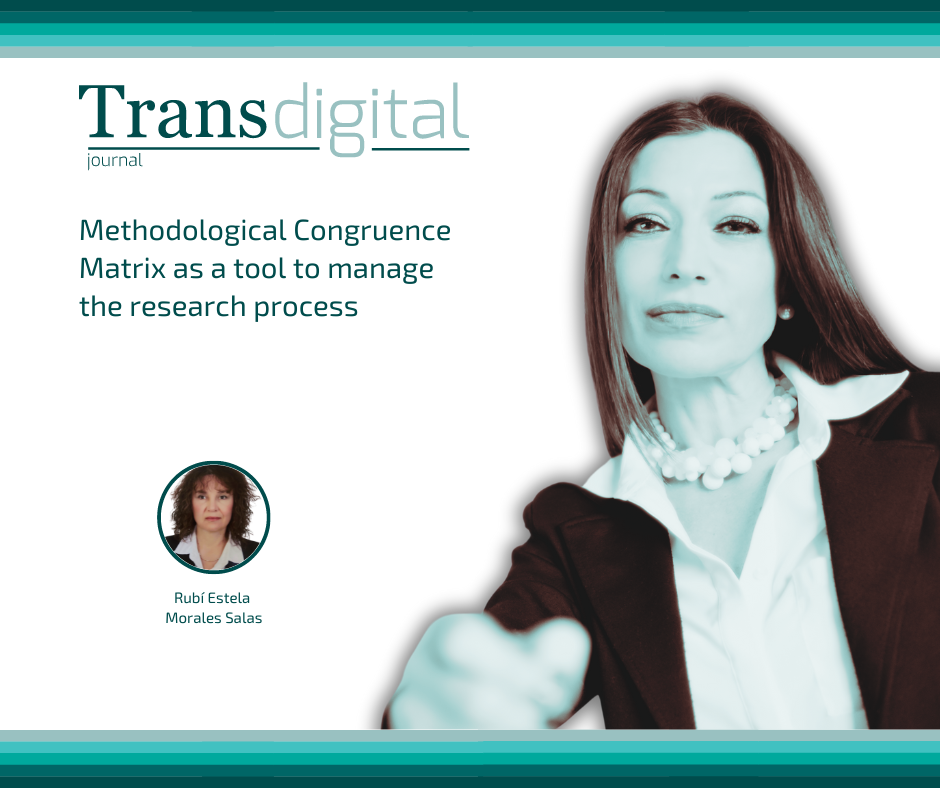Methodological Congruence Matrix as a tool to manage the research process
DOI:
https://doi.org/10.56162/transdigital337Keywords:
Methodological Congruence Matrix, tool, management, research process, higher educationAbstract
Effective research project management is essential for success and the generation of significant outcomes This article presents the Methodological Congruence Matrix (MCM) as a key tool for researchers and professionals, providing a practical and strategic guide that facilitates the management of research projects. The aim is to provide researchers and professionals with a practical and strategic guide for the management of research projects, highlighting the methodological design as a fundamental pillar through the implementation of a matrix as a tool that ensures the coherent and effective alignment of each step of the investigative process. A documentary method was used to explore the methodological process in the research, reviewing various sources. After implementing the MCM, students' perceptions of its usefulness and applicability were analyzed using descriptive statistics. The MCM was continuously improved based on its application in research projects of bachelor's, master’s, and doctoral students. The results show a high acceptance and positive perception of the MCM at all academic levels, reflecting an auspicious evaluation of this methodological tool. In conclusion, the MCM is a valuable guide that ensures the coherence and effectiveness of the research process, improving the quality and success of research projects.
References
Aranda, T., & Araújo, E. G. (2009). Técnicas e instrumentos cualitativos de recogida de datos. Documento de trabajo. https://gc.scalahed.com/recursos/files/r161r/w25291w/Campoy_Tecnicas_e_instrum_cualita_recogidainformacion.pdf
Arias Gonzáles, J. L. (2021). Guía para elaborar el planteamiento del problema de una tesis: el método del hexágono. Revista Arbitrada: Orinoco, Pensamiento y Praxis, (13), 58-69. https://dialnet.unirioja.es/servlet/articulo?codigo=7798562
Ariza, D. A. (2017). Efectividad de la gestión de los proyectos: una perspectiva constructivista. Obras y proyectos, (22), 75-85. https://www.scielo.cl/scielo.php?pid=S0718-28132017000200075&script=sci_arttext
Castillo-Allendes, A., & Fouillioux, C. (2021). Objetivos de intervención en voz: Una propuesta para su análisis y redacción. Revista de Investigación e Innovación en Ciencias de la Salud, 3(1), 125-139. https://riics.info/index.php/RCMC/article/view/56/84
Coronel-Carvajal, C. (2023). Los objetivos de la investigación. Revista Archivo Médico de Camagüey, 27. https://revistaamc.sld.cu/index.php/amc/article/view/9077/4534
Couto Corrêa, F. (2017). Gestión de datos de investigación. Editorial UOC.
Creswell, J. W., & Creswell, J. D. (2017). Research design: Qualitative, quantitative, and mixed methods approaches. SAGE Publications.
Espinoza Freire, E. E. (2018). El problema de investigación. Conrado, 14(64), 22-32. https://conrado.ucf.edu.cu/index.php/conrado/article/view/808/816
Hernández-Sampieri, R., & Mendoza, C. (2020). Metodología de la investigación: las rutas cuantitativa, cualitativa y mixta. McGraw-Hill.
Hernández-Sampieri, R., Fernández, C., & Baptista, P. (2014). Metodología de la Investigación (6ta. ed.). McGraw-Hill.
Méndez, I., Namihira, D., Moreno, L., & Sosa, C. (2001). El protocolo de investigación. Trillas.
Morales Salas, R. E. (2021). La divulgación de la ciencia en el siglo XXI. Emerging Trends in Education, 4(7). https://doi.org/10.19136/etie.a4n7.4457
Mousalli-Kayat, G. (2015). Métodos y diseños de investigación cuantitativa. Documento de trabajo. https://www.researchgate.net/profile/Gloria-Mousalli/publication/303895876_Metodos_y_Disenos_de_Investigacion_Cuantitativa/links/575b200a08ae414b8e4677f3/Metodos-y-Disenos-de-Investigacion-Cuantitativa.pdf
Northouse, P. G. (2021). Leadership: Theory and practice. SAGE Publications.
Patton, M. Q. (2002). Qualitative research & evaluation methods. SAGE.
Ramos Montiel, R. R., Cabrera Cabrera, G. E., Urgiles Urgiles, C. D., & Jara Centeno, F. E. (2018). Aspectos metodológicos de la investigación. Reciamuc, 2(3), 194-211. https://www.reciamuc.com/index.php/RECIAMUC/article/view/111
Robles Pastor, B. F. (2019). Población y muestra. Pueblo continente, 30(1), 245-247. http://journal.upao.edu.pe/PuebloContinente/article/view/1269
Tamayo, M. (2001). El proceso de la investigación científica. Editorial Limusa.
Vizcaíno Zúñiga, P. I., Cedeño Cedeño , R. J., & Maldonado Palacios , I. A. (2023). Metodología de la investigación científica: guía práctica. Ciencia Latina Revista Científica Multidisciplinar, 7(4), 9723-9762. https://doi.org/10.37811/cl_rcm.v7i4.7658
Walker, R. (1989). Métodos de investigación para el profesorado. Ediciones Morata.
Wallace, W. (2014). Gestión de proyectos. Documento de trabajo. Edinburhg Business School. Heriot-Watt University. https://ebs.online.hw.ac.uk/documents/course-tasters/spanish/pdf/pr-bk-taster.pdf
Yin, R. K. (2009). Case study research: Design and methods (Vol. 5). SAGE publications.
Zafra Galvis, O. (2006). Tipos de investigación. Revista Científica General José María Córdova, 4(4), 13-14. https://www.redalyc.org/pdf/4762/476259067004.pdf

Downloads
Autor de correspondencia
El autor de correspodencia se identifica con el siguiente símbolo: *Published
How to Cite
License
Copyright (c) 2024 Rubí Estela Morales Salas

This work is licensed under a Creative Commons Attribution 4.0 International License.
All articles in Transdigital are licensed under a Creative Commons Attribution 4.0 International License. Authors hold the copyright and retain publishing rights without restrictions.









